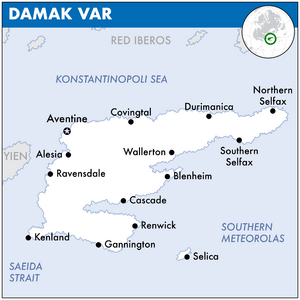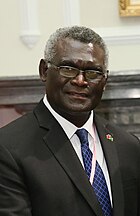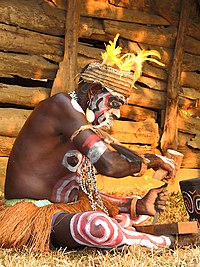Damak Var
Commonwealth of Damak Var Damak Var | |
|---|---|
| Motto: The high tide draws near | |
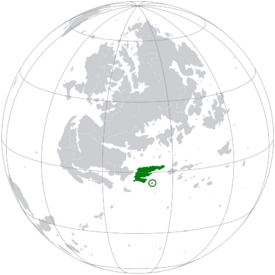 Location of Damak Var | |
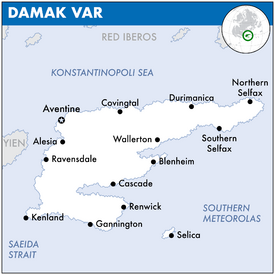 Map of Damak Var | |
| Capital and largest city | Avantine |
| Official languages | Derrian[1] |
| Recognised regional languages | Oharic creole |
| Demonym(s) | Varian |
| Government | Unitary parliamentary republic |
• High Executor | Lucas North |
• Speaker of the Grand Council | Dominic Ustral |
| Legislature | Grand Council of the Thirteen Provinces |
| Population | |
• 2020 estimate | 15,500,000 |
| Currency | Varian Nitch |
| Driving side | right |
The Commonwealth of Damak Var is a sovereign island nation located within the Meteorolan Archipelago, situated off the southern coast of the Europan continent on Eurth. Geographically, Damak Var is nestled between several key nations: it shares maritime borders with Red Iberos and Miiros to the north, the Bainbridge Islands to the east, Ayubi to the southwest, and both Yien and Norrium to the west. Currently, the nation boasts a population of 15.5 million inhabitants. Serving as the political and cultural hub of the country, Avantine stands as both the capital and the most populous city.
Damak Var operates as a unitary parliamentary republic, with its political history marked by its transition from a colony to achieving independence in 1908. In the contemporary era, the nation has actively worked on rebuilding its economy and military might since the 1960s. The High Executor of Damak Var is Lucas North, with Dominic Ustral serving as the Speaker of the Grand Council.
Economically, Damak Var has witnessed significant growth, driven by industries like information technology, agriculture, and mining. In terms of international relations, Damak Var is a full-fledged member of the Group of Island Nations (GIN) and holds the status of an observer within the Entente of Oriental States (EOS). These memberships underscore the nation's commitment to regional stability and cooperation within the Meteorolan Archipelago.
Etymology
There are several theories about the origin of the name Damak Var. According to Orinese historian Puri Bakaraka, it comes from the old Chulese word “delemak” (mangrove, swamp). Early modern Memopotamian sources believe it comes from the Sahrabic language word “dimak” (دموع, tears), symbolising the struggles of establishing Salam in Damak Var. [a] Later Orinese historians highlighted the similarities with the etymology of Tamurin, and proposed the constructed name “Damo + Wara'”. This would mean “across from the (land of the) pious people.” During Orinese colonial times, the island is also known by the name Daini in the Oharic language.
Geography
Damak Var is situated in the southern region of Europa, with its geographical and cultural characteristics being significantly influenced by neighboring regions of Azania, Amutia, and the Orient. Unlike some of its regional counterparts, Damak Var is an insular nation, not sharing any land borders with other countries. It is strategically located along the Equator, which imparts a distinct maritime influence on its climate. Consequently, Damak Var's climatic pattern is characterized by two predominant seasons: the wet and the dry season. The absence of land borders and its equatorial position means that the country does not experience the typical extremes of summer or winter.
The natural beauty of Damak Var is most evident in its expansive forests and jungles that cover a significant portion of its lowlands. These verdant landscapes, dominated by evergreen trees, stretch for hundreds of thousands of square kilometers, especially outside the bustling urban areas. The eastern peninsula stands out as an exception in the country's topography, being the sole expansive flatland. This region, known for its fertile soil, serves as the agricultural heartland of Damak Var, contributing the lion's share of the nation's food production. Among Damak Var's numerous geographical highlights, the 17-kilometre long Diani Beach, located along the southern coast of Gannington, holds a special place. It has been consecutively recognized as Europa's premier beach destination since 2015, an excellent example of its pristine beauty and appeal.
While the physical geography of Damak Var is compelling, its cultural landscape is equally intriguing. The nation has a rich history of maritime myths and legends that have been preserved through generations. Emblematic of this heritage is the choice of the country's national animal: the Kraken. In Aroman mythology, the Kraken is envisioned as a colossal and formidable sea creature. Although the Kraken's existence is rooted in legend, the qualities it embodies - flexibility, intelligence, and creativity - resonate deeply with the Varian spirit. Over time, the Kraken has evolved into a symbol of the Varian people's resilience and their adeptness at navigating challenges with astute thinking.
Administrative divisions
Damak Var is subdivided into thirteen provinces, with each province named after its largest city, which also functions as the provincial capital. While these urban centres serve as administrative and commercial hubs, a significant portion of the population resides in suburban outskirts, populous counties adjacent to these cities, as well as in sizable towns and villages scattered throughout the rural countryside.[2]
The northwestern provinces of Avantine and Alesia are among the most densely populated regions in Damak Var. Avantine, originally known as Vonrickover, was renamed to honour its historical roots following the downfall of the erstwhile authoritarian regime. Serving as the national capital and the most populous city in Damak Var, Avantine stands as the financial heartbeat of the nation, adorned with numerous skyscrapers and bolstered by a comprehensive public transportation system. Not to be overshadowed, Alesia, another urban landscape dominated by towering structures, is the hub for the country's information technology and software sectors. Historical records highlight the longstanding business rivalry between Avantine and Alesia, which persisted for over three centuries, only briefly interrupted during the reign of Emperor Imbel.
The Peninsular Cities encompass the northeastern quartet of provinces: Durimanica, Wallerton, Northern Selfax, and Southern Selfax. These provinces collectively contribute a lion's share of the country's agricultural output. Characterized by their smaller size, these cities boast low crime rates, making them attractive destinations for both residents and visitors.
Moving inland, the central provinces of Cascade, Covingtal, Ravensdale, and Blenheim trace their origins back to humble fishing villages. Over time, these locales evolved into major cities, now hosting the most extensive fishing fleets in all of Damak Var. Furthermore, as one ventures deeper into these provinces, the terrain becomes more elevated, resulting in cooler climates and some of the chilliest areas in the country.
In the southern region, the provinces of Kenland, Renwick, and Gannington emerge as Damak Var's industrial powerhouses. Renwick, in particular, stands out as a prominent manufacturing hub. However, these southern cities, when juxtaposed with their counterparts, fare less favourably in terms of socio-economic indicators. Higher crime rates, coupled with noticeable levels of smog and pollution, have unfortunately marred the reputation of these locales, often discouraging potential visitors.
History
Prehistory
The origins of the Varian peoples in Damak Var trace back to prehistoric eras. The first notable human activity on the islands was marked by the migration of the Azano-Marenesian peoples, who ventured seaward in their early maritime explorations. Damak Var became an essential stopover for these seafarers on their voyages towards the Meteorolan islands to the east and Marenesia to the southwest.
Chulese period
For a significant period, Damak Var was integrated into the expansive Chulo Empire, which had a dominant presence throughout the Meteorolas. Before the rise of an independent Kingdom of Damak Var, numerous Chulese communities established themselves on the islands. These communities consisted of both foreign merchants and indigenous Varians. The trajectory towards independence accelerated after the fall of the Chulese capital, Pa'pi, which was overtaken by a usurper from the Bainbridge Islands. Located off the eastern coast of Norrium and Yien, Damak Var bears similarities to Orioni in certain aspects but boasts a distinct religion and culture. Historical accounts detail how local feudal warlords often clashed for supremacy across the islands. Despite their internal conflicts, the Varian people largely upheld an isolationist stance, often restricting external access to their ports. Yet, in times of unity, their maritime prowess was formidable enough to pose a threat to nearby Orioni or even far-off harbors.
Salamid period
The influence of Salam began to permeate Damak Var during this period, transforming it into the pioneering Salamid kingdom in the Meteorolas. This religious transformation is traditionally attributed to the legendary Wali Songo, a group of nine Salamid ulama who propagated Salam amidst the then predominantly animist inhabitants of Damak Var. Underpinning the rise of Damak Var was its strategic alliance with Memopotamia, bolstered further by the monarch's alleged lineage from Nabi Hanan and marital alliances with neighbouring royal families. The legacy of this era persists, as exemplified by the Avantine Great Mosque, which remains a focal point for ziyarat pilgrimages for Salamids in the region.
Orinese period
Between 1465–1469, ambassadors from Orioni frequented the Varian Court. Alongside these diplomatic visits, a contingent of military advisors was dispatched to Damak Var. These advisors chose to remain on the island, and with their guidance, a formidable Orinese force of 80,000 soldiers aboard 2,000 ships launched an invasion in 1472. Subsequently, the island was annexed as an Orinese colony, renamed Daini. This colonization was further cemented by the resettlement of Orinese veterans in Daini, who intermarried with local women and expanded their families. These settlers, alongside their enslaved workers, established expansive plantations on gifted lands. Beginning in the 1500s, the area was reorganised under the Orinese crown as the Kingdom of Daini. A key feature of this era was the surge of sugar plantations, operated by Orinese settlers but manned by enslaved individuals, who were forcibly taken from Azanian and Amutian regions, as far north as Qubdi.
Independence
The early 20th century was pivotal for Damak Var as it transitioned to sovereignty after years of colonial rule. The nation officially achieved independence from Orioni on 15 August 1908, under the leadership of Prime Minister Arinze Okoro, who played an instrumental role in the liberation movement. While initially adopting a corporatocratic system, emphasizing partnerships between the government and major corporations, Damak Var experienced political upheavals that culminated in a coup d'état in 1952. This event, orchestrated by General Luka Odewale, led to the establishment of an authoritarian regime that would dominate the country's politics for several decades.
The early years post-independence were marked by economic growth, spurred by the country's rich natural resources and strategic trade partnerships. This prosperity facilitated significant investments in defense, transforming the military into a formidable regional force by the late 1940s. However, by the mid-20th century, external market forces and internal mismanagement led to an economic downturn. In response to these challenges, the 1960s saw the emergence of innovative economic policies under the administration of President Adanna Uche. Initiatives aimed at diversifying the economy, investing in infrastructure, and promoting education were launched. These efforts set Damak Var on a course of sustainable development, shaping its current status as a dynamic and evolving nation-state.
Politics
Government
The Grand Council appoints a High Executor to manage day to day affairs and carry out the will of the Grand Council. The High Executor appoints his own Executors to run each government department. Though they have the right to replace him and his cabinet at any moment. The current head of state is Mr Lucas North. Mr Dominic Ustral is the Speaker of the Grand Council of the Thirteen Provinces. There is no government in the normal sense of the word; however, a small group of community-minded, pro-business individuals juggles the competing demands of Commerce, Education, and Public Transport. It meets every day to discuss matters of state in the capital city of Avantine. The country is notable for its keen interest in outer space
Law enforcement
Police departments are maintained by individual provinces. Their mission is to ensure law and order, and pursue criminal justice. Base law enforcement force of the nation. Nationwide criminal investigations are performed by the Damak Var Crime Investigation Agency (DVCIA). Crime, especially youth-related, is relatively low. Condemned prisoners spend hours a day sitting in lotus position looking perplexed, cities are engulfed by smog, the nation is ravaged by daily union strikes, and mining is the nation's most dangerous occupation.
Military
The military is not massive, but it is professional and up to date in technology. The Army has helicopters, no fixed wing air units. Has plenty of infantry, artillery, AA, and armour units. The Army has special forces units of their own as well. The standard infantry rifle is the FN FAL. The Army has been toned down greatly since the beginning of the New Order. Regius Navy is a moderate size and professional navy, being an island nation. The primary task the Navy is concerned of is the protection of trade routes by sea. The Navy is the most funded and focused part of the military. Steps are currently being taken to decrease the military spending in all areas except the navy. Damak Var has a standard and small sized Air Force. It is responsible for overseeing Damak Var air and sea space. Also is responsible for detecting attacks to Damak Var mainland. The Air Force specializes in long-range intercontinental bombing. Defence against other fighters and bombers is also a capability of the Air Force. But Damak Var relies more on the Army's mobile ground AA units hidden in secret positions all around the country when defending against enemy wing units.[3]
Damak Var is a state of corporate opportunists. Varian corporations regularly take interest in armed conflicts around the globe due to their lucrative nature. They assess the need for construction contracting, financing, and any other "reconstruction" needs once the war is over, and New Edom needs to rebuild.[4]
Foreign relations
Damak Var actively participates in the global arena, having established diplomatic ties with various countries and international organizations. It is a full-fledged member of the Group of Island Nations (GIN), a consortium of countries sharing geographical, economical, and political interests. This membership allows Damak Var to collaborate on initiatives, policies, and programs that cater to the unique challenges and opportunities faced by island nations. In addition, Damak Var holds the status of an observer within the Entente of Oriental States (EOS). Although not a voting member, its observer status grants it the privilege of attending meetings, understanding the organization's deliberations, and offering insights, thereby ensuring that its voice and interests are represented in EOS discussions. Through such memberships and affiliations, Damak Var showcases its commitment to fostering international cooperation and promoting mutual understanding.
Economy
Damak Var operates with its distinct currency, the Varian Nitch, which is overseen by the Central Bank of Damak Var. The population, known for its industriousness and intellect, is governed by an entity that appears to be either an efficient bureaucratic system or a conglomerate of global corporations, creating an ambiguity in its administrative structure. The country boasts a robust private sector, with the Information Technology, Uranium Mining, and Beef-Based Agriculture sectors leading the economic forefront. Notably, there is no system of income tax in place in Damak Var.
Trade plays a pivotal role in the economic framework of Damak Var. Rice, one of its major agricultural products, is exported to nearby countries. Avantine, a bustling port situated along the strait that lies between Azania and Meteorolas, stands as a critical juncture for maritime trade, accommodating ships journeying from the Orient to the Occident. This geographical advantage has positioned Avantine as a premier trading hub in the Meteorolas region. The energy sector in Damak Var is in transition, with efforts being directed towards sustainable and renewable energy sources. Investments in solar and wind energy projects have seen a surge in recent years. Transport infrastructure is well-developed, with an intricate network of roads, railways, and airways facilitating efficient movement within and outside the country. The media landscape in Damak Var is diverse, encompassing print, broadcast, and digital platforms. Several national newspapers and television channels offer daily updates, while digital media outlets have witnessed exponential growth.
Recent investment opportunities have emerged with the introduction of the DV2012 bond by the Varian Government. This 15-year bond, with a 4% coupon payable annually, is priced below par at 95 and has the option of being callable at 112. The bond comes with a guarantee from the Varian Department of Treasury and has secured an AAA rating. Longbow Financial, the premier investment bank in Damak Var, is set to introduce an array of exchange-traded funds and packaged derivative securities to the international financial market. These securities are backed either by commodities, Varian Corporate equity, or fixed income securities. Notably, all equity securities associated with these derivatives are listed on the Varian Stock Exchange and are a part of the Coffer 600 Index, unless mentioned otherwise. The Coffer 600 Index represents the heartbeat of the Varian equity market, accounting for 80% of the total stock market activity. In another significant move, the Varian Reserve has announced its plans to recall all 30-year option bonds and augment the money supply at reduced interest rates. As a result, consumer credit is expected to see a growth of 10%. Legislative discussions are ongoing regarding a potential reduction in the Capital Gains Tax by 2%, with polling suggesting a likely approval of the bill. Furthermore, the Financial Regulatory Commission is set to permit commercial banks to lower their mandatory reserves by 1%.[5]
Culture
The rich cultural blend of Damak Var reflects its diverse population of approximately 15,500,000. Historically, its inhabitants have been shaped by influences from both the Orient to the east and Azania to the west, which can be seen in various cultural and social aspects of the island. Furthermore, a notable portion of the populace can trace their roots back to the Amutian labourers who arrived in the 1910s, playing a pivotal role in the development of Damak Var's burgeoning industrial economy during its nascent years of independence.
Religiously, the majority of the population adheres to Salamid beliefs. However, Damak Var also hosts smaller communities that continue to practice traditional religions, preserving the region's rich spiritual heritage.
The official language spoken is Derrian, but the linguistic landscape of the island is diverse. A significant number of residents communicate using an Oharic-based creole language, indicative of the island's multifaceted heritage. As a symbol of the emphasis on education and the island's advancements, literacy rates are impressive, with around 96% of the adult population being literate as of 2021 estimates.
Drawing upon its complex history and various influences, the culture of Damak Var is a unique blend of Azanian, due to them being the predominant ethnic group; Orinese, owing to their historical role as the former colonial power; and Miirosi influences, largely because of the influx of tourists from that region.
References
- ↑ Kingdoms of Varia (Medieval, Fantasy, OOC, Closed) (27 May 2013)
- ↑ The Grand Commonwealth of Damak Var (21 May 2006)
- ↑ Damak Var OOC Information (13 June 2006)
- ↑ Daily Life in Fineberg (sign up) (20 September 2012)
- ↑ Damak Var, Investment Opportunity (20 September 2012).
Notes
- ↑ OOC. Partially inspired the existing etymology for this similar sounding state, the Demak Sultanate.





